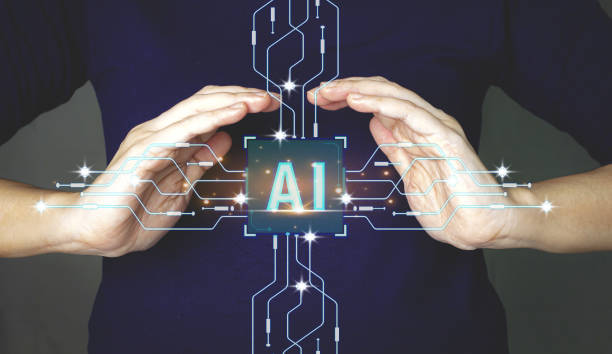What is Artificial Intelligence and Why Does It Matter?

#Artificial_Intelligence (Artificial Intelligence or AI) refers to the ability of a computer system or robot to perform tasks that typically require human intelligence.
These tasks include learning, problem-solving, pattern recognition, natural language understanding, and decision-making.
The importance of artificial intelligence in today’s world is due to its high potential for improving and automating processes in various industries.
From supply chain optimization (Oracle) to disease detection in Healthcare (IBM), artificial intelligence can increase efficiency, reduce costs, and accelerate innovation.
In fact, artificial intelligence is not just a technology, but a collection of techniques and approaches that allow machines to do things that previously only humans were capable of doing.
This technology is constantly advancing, and its impact on society and the economy is increasing day by day.
From self-driving cars to intelligent virtual assistants, artificial intelligence is changing the way we live and work.
Artificial intelligence, as a catalyst for innovation and progress, plays an important role in shaping the future.
Is your company’s website as professional and reliable as it should be? Create an online presence that reflects your credibility and attracts more customers with specialized corporate website design by Rasaweb.
✅ Building a powerful and professional image of your brand
✅ Converting visitors into real customers
⚡ Get a free consultation right now!
Types of Artificial Intelligence in Terms of Ability

Artificial intelligence can be divided into several main categories based on its capabilities.
- Narrow or Weak AI This type of artificial intelligence is designed to perform a specific task and performs very well in that area.
Examples include facial recognition systems, spam filters, and search engines. - General or Strong AI This type of artificial intelligence has the ability to perform any task that a human can do.
Achieving general artificial intelligence is still a major challenge and does not currently exist. - Super AI This type of artificial intelligence surpasses human intelligence and is capable of solving problems that humans are unable to solve.
This level of artificial intelligence is still hypothetical and does not currently exist.
Currently, most of the artificial intelligence systems we interact with are of the narrow AI type.
These systems are very efficient in their specialized fields but are not capable of performing tasks outside their designed scope.
Research in the field of general and super artificial intelligence is ongoing, but achieving these levels of artificial intelligence requires significant advances in computer science and cognitive science.
Applications of Artificial Intelligence in Various Industries

Artificial intelligence has widespread applications in various industries and is constantly changing and evolving.
Here are some of its most important applications:
- Healthcare Artificial intelligence is used in disease diagnosis, drug development, treatment personalization, and hospital management.
- Finance Artificial intelligence is used in fraud detection, risk management, providing financial advisory services, and automating banking processes (FICO).
- Manufacturing Artificial intelligence is used in optimizing production processes, quality control, predicting machine failures, and managing the supply chain (GE Digital).
- Retail Artificial intelligence is used in personalizing the shopping experience, predicting demand, managing inventory, and providing customer service.
- Transportation Artificial intelligence is used in the development of self-driving cars, optimizing routes, managing traffic, and improving transportation safety.
These applications are just an example of the high potential of artificial intelligence in various industries.
As technology advances, it is expected that the applications of artificial intelligence will become more widespread and complex in the future.
| Industry | Application |
|---|---|
| Healthcare | Disease diagnosis, drug development |
| Finance | Fraud detection, risk management |
| Manufacturing | Process optimization, quality control |
| Retail | Purchase personalization, demand forecasting |
| Transportation | Self-driving cars, route optimization |
Key Algorithms in Artificial Intelligence

Artificial intelligence uses various algorithms to perform its tasks.
Some of the most important of these algorithms include:
- Machine Learning Algorithms that allow machines to learn from data and improve their performance without explicit programming.
- Deep Learning A type of machine learning that uses deep neural networks to analyze data.
These algorithms have been very successful in image recognition, natural language processing, and many other applications. - Natural Language Processing or NLP Algorithms that allow machines to understand and generate human language.
These algorithms are used in machine translation, sentiment analysis, and chatbots. - Expert Systems Systems that simulate the knowledge and experience of an expert in a particular field and can act as an advisor or guide.
- Genetic Algorithms Algorithms that use the principles of natural evolution to solve optimization problems.
These algorithms form the basis of many artificial intelligence systems.
By combining and optimizing these algorithms, more complex artificial intelligence systems can be created that are capable of solving more difficult problems.
Artificial intelligence plays an important role in the world of technology, and it is with the help of these algorithms that great advances have been achieved.
Is your company’s website as professional and reliable as it should be? Create an online presence that reflects your credibility and attracts more customers with specialized corporate website design by Rasaweb.
✅ Building a powerful and professional image of your brand
✅ Converting visitors into real customers
⚡ Get a free consultation right now!
Challenges and Limitations of Artificial Intelligence

Despite its high potential, artificial intelligence also faces challenges and limitations.
Some of the most important of these challenges include:
- Need for Big Data Many artificial intelligence algorithms, especially deep learning algorithms, require large amounts of data to function correctly.
- Ethical Issues The use of artificial intelligence can create various ethical issues, including discrimination, privacy, and accountability.
- Lack of Expertise The development and implementation of artificial intelligence systems require experienced specialists, of whom there is currently a shortage.
- Interpretability Some artificial intelligence algorithms, especially deep learning algorithms, are difficult to interpret, and it is difficult to understand how they make decisions.
- Hardware Dependency Some artificial intelligence algorithms, especially deep learning algorithms, require powerful hardware, which increases their implementation cost.
Overcoming these challenges and limitations requires joint efforts from researchers, policymakers, and industry activists.
By addressing these issues, the benefits of artificial intelligence can be harnessed while avoiding its potential risks.
The development of artificial intelligence must be carried out in compliance with ethical principles and taking into account its social consequences.
The Future of Artificial Intelligence and its Impact on Our Lives

The future of artificial intelligence is bright and full of new opportunities.
It is expected that artificial intelligence will play a more important role in our lives in the future and have a profound impact on society and the economy.
- Automation Artificial intelligence can automate many repetitive and tedious tasks, allowing humans to focus on more creative and strategic tasks.
- Personalization Artificial intelligence can personalize services and products based on individual needs and preferences.
- Improved Decision Making Artificial intelligence can help humans make better decisions by analyzing big data and providing new insights.
- Creating New Opportunities Artificial intelligence can create new job opportunities that did not exist before.
- Changes in Education and Learning Artificial intelligence can help personalize the learning process and allow students to learn at their own pace and in their own way.
However, to fully benefit from the advantages of artificial intelligence, its challenges and limitations must also be taken into account and efforts made to solve them.
Training the workforce, formulating appropriate laws and regulations, and creating a public discourse on the ethical issues of artificial intelligence are among the actions that need to be taken.
Artificial intelligence can have many positive effects on human life.
What is the Difference Between Artificial Intelligence and Machine Learning?

The terms #artificial_intelligence and machine learning are often used interchangeably, but there are actually fundamental differences between them.
Artificial intelligence is a broader concept that refers to the ability of machines to perform tasks that typically require human intelligence.
Machine learning is a subset of artificial intelligence that focuses on developing algorithms that allow machines to learn from data and improve their performance without explicit programming.
In other words, artificial intelligence is the ultimate goal, and machine learning is one of the tools used to achieve this goal.
Deep learning itself is a subset of machine learning that uses deep neural networks to analyze data.
| Feature | Artificial Intelligence | Machine Learning |
|---|---|---|
| Concept | The ability of a machine to perform intelligent tasks | Developing algorithms to learn from data |
| Goal | Creating machines that can think like humans | Improving the performance of machines through experience |
| Relationship | A broader concept | A subset of artificial intelligence |
The Role of Data in the Development of Artificial Intelligence

Data plays a very important role in the development and functioning of artificial intelligence.
Machine learning algorithms require large amounts of data to learn and improve their performance.
The more data there is, and the more diverse it is, the more complex patterns the algorithms can identify and the more accurate decisions they can make.
That’s why companies that have access to large amounts of data, such as Google and Facebook, are leading in the field of artificial intelligence.
Data quality is also very important.
Incorrect or incomplete data can lead to wrong decisions and reduce the performance of algorithms.
Collecting, cleaning, and labeling data are among the important steps in developing artificial intelligence systems.
In addition to the volume and quality of data, the diversity of data is also important.
Algorithms that have been trained on diverse data can perform better in different conditions and achieve more accurate results.
In general, data is the fuel of artificial intelligence, and without it, the development of intelligent systems is not possible.
Did you know that 94% of first impressions of a company are related to its website design?
Rasaweb helps you create the best first impression by providing professional corporate website design services.
✅ Create a professional and reliable image of your brand
✅ Easier attraction of potential customers and improved online ranking
⚡ Get a free corporate website design consultation
Artificial Intelligence Development Tools

To develop artificial intelligence systems, there are various tools and libraries that help developers implement algorithms and train their models.
Some of the most popular of these tools include:
- TensorFlow is an open-source library developed by Google and used for machine learning and deep learning.
- PyTorch is another open-source library developed by Facebook and is very popular for deep learning.
- Scikit-learn is a Python library that includes various machine learning algorithms and is used for classification, regression, and clustering tasks.
- Keras is a high-level interface for TensorFlow and Theano that makes it easier to develop deep learning models.
- Theano is a Python library that is used for numerical computations and is particularly suitable for deep learning.
These tools help developers quickly and easily develop and test their artificial intelligence systems.
Also, many cloud platforms offer artificial intelligence services that allow users to use artificial intelligence algorithms without the need for hardware infrastructure.
Artificial intelligence, with the help of these tools, has become more accessible to everyone.
Ethical Considerations in Artificial Intelligence

The development and use of artificial intelligence is associated with various ethical considerations that should be considered.
Some of the most important of these considerations include:
- Privacy Artificial intelligence systems often require large amounts of personal data, which can endanger the privacy of individuals.
- Discrimination Artificial intelligence algorithms can reproduce existing biases in data and lead to unfair decisions.
- Accountability It is difficult to determine responsibility if an artificial intelligence system makes a mistake.
- Transparency The way some artificial intelligence algorithms make decisions, especially deep learning algorithms, is difficult to understand.
- Impact on Employment Automation caused by artificial intelligence can lead to job losses.
To address these ethical considerations, appropriate laws and regulations should be developed, and artificial intelligence developers should follow ethical principles in the design and implementation of their systems.
Also, public education on the ethical issues of artificial intelligence can help increase awareness and accountability.
The use of artificial intelligence should be carried out in compliance with human rights and in the interests of society.
Frequently Asked Questions
| Question | Answer |
|---|---|
| 1. What is Artificial Intelligence (AI)? | It is a branch of computer science that aims to create machines capable of simulating human intelligence and performing tasks that require human thinking, such as learning, problem-solving, and decision-making. |
| 2. What are the main types of artificial intelligence? | It can be classified into narrow AI (Narrow AI) that focuses on a specific task, general AI (General AI) that possesses comprehensive human capabilities, and super AI (Super AI) that exceeds human intelligence. |
| 3. Mention some common applications of artificial intelligence in our daily lives. | These include voice assistants (such as Siri and Alexa), recommendation systems (such as Netflix and Amazon), self-driving cars, facial recognition systems, and spam filters. |
| 4. What is the difference between artificial intelligence and machine learning (Machine Learning)? | Artificial intelligence is the broader concept of creating intelligent machines, while machine learning is a subset of artificial intelligence that focuses on enabling systems to learn from data without explicit programming. |
| 5. What is Deep Learning? | It is a subset of machine learning that uses multi-layered artificial neural networks (deep neural networks) to process data and discover complex patterns and is used in image and speech recognition. |
| 6. What are the main benefits of artificial intelligence? | Improving efficiency and productivity, automating repetitive tasks, making better decisions based on the analysis of big data, and developing solutions to complex problems in areas such as medicine and science. |
| 7. What are the main challenges facing the development and deployment of artificial intelligence? | These include the need for huge amounts of high-quality data, privacy and security issues, bias in data and algorithms, and high development and maintenance costs. |
| 8. Does artificial intelligence raise ethical or social concerns? | Yes, it raises concerns related to privacy, algorithmic bias, job loss due to automation, responsibility for errors made by intelligent systems, and the need for a regulatory framework. |
| 9. How can artificial intelligence affect the future of the labor market? | It can lead to the automation of some routine jobs, but it will also create new jobs that require advanced skills in developing, operating, and maintaining artificial intelligence systems. |
| 10. What are some modern or promising technologies in the field of artificial intelligence? | These include advanced natural language processing (NLP) (such as large language models like ChatGPT), computer vision, robotics, and generative AI (Generative AI). |
And other services of Rasa Web Advertising Agency in the field of advertising
Smart Social Media: An innovative service to increase customer acquisition through attractive user interface design.
Intelligent Custom Software: Transform digital branding with the help of exclusive programming.
Intelligent Reportage: A professional solution to analyze customer behavior with a focus on intelligent data analysis.
Smart Digital Advertising: An effective tool to manage campaigns by optimizing key pages.
Intelligent Reportage: A combination of creativity and technology to analyze customer behavior by customizing the user experience.
And more than hundreds of other services in the field of Internet advertising, advertising consulting, and organizational solutions
Internet Advertising | Advertising Strategy | Reportage Ad
Resources
Artificial Intelligence and its impact on the future of the world
,Applications of artificial intelligence in everyday life
,What is artificial intelligence? Applications and types of artificial intelligence
,Everything about artificial intelligence: from history to applications and the future of artificial intelligence
? Are you ready to transform your business in the digital world? Rasa Web Digital Marketing Agency offers comprehensive services, including personal website design, SEO, and content marketing, providing innovative solutions for your growth and visibility.
📍 Tehran, Mirdamad Street, next to the Central Bank, South Kazerun Alley, Ramin Alley, No. 6




